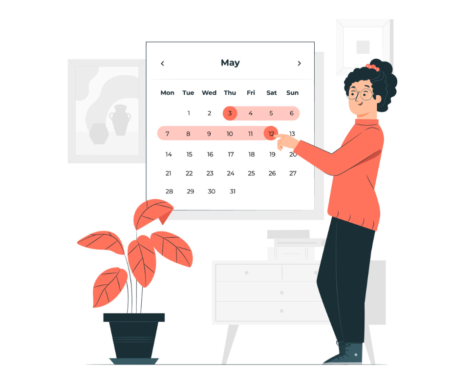LESSON OVERVIEW
The main objectives of this beginner lesson on numbers and dates are to:
- review dates, numbers and days of the week;
- listen to an audio of people discussing their plans;
- work with numbers in various situations.
With this lesson, students guess numbers, count and compare quantities of different things and work with fun numerical trivia. They listen to a recording where people talk about their plans, review the days of the week, months and ordinal numbers and talk about important dates and celebrations. Students also play a game of ‘Battleship’ where they place their ‘ships’ by marking dates on calendars.
GUESS MY NUMBER
In this part of this beginner lesson on numbers and dates, students work in pairs. Student A writes down a number while Student B guesses it using “higher” or “lower” hints. They then swap roles and complete six rounds.
HOW MANY HAVE YOU GOT?
Students get a list of things and some information about how many of each thing they have got (e.g. 33 books, 13 pens, 27 photos). They talk to their partner and say how many things they have got together. Students then repeat with new cards.
DO YOU KNOW HOW MANY…?
In this task, students get a card with questions. Each question has three answer choices and the correct answer is in bold. They ask their partner each question, read the options and check their answer.
DAYS OF THE WEEK
Students listen to a recording where people talk about their plans for the coming week. They say which event happens first and which happens second. Afterwards, from memory, they write down the day each event takes place. They listen to the recording again and check their answers.
MONTHS BINGO
This beginner lesson on numbers and dates contains a well-known game. Students draw a grid with nine cells containing the names of months. They then listen to the names of the months and cross out what they hear. Students say ‘bingo’ when they have crossed out three months down, across or diagonally.
ORDINAL NUMBERS
Students complete gaps with an ordinal number (e.g. December is the twelfth month of the year). After that, they ask their partner questions so that they answer using the words provided in the task (e.g. Christmas Day, January, Thursday). Students start the questions with ‘What is… ’.
DATES
In this activity, students complete dates by adding days, weeks and months (e.g. 19th November + 6 days = 25th November).
BATTLESHIP
Students play a game of ‘Battleship’. They get cards with calendars and secretly place their ‘ships’ by marking specific dates. Students then take turns guessing a date to find their partner’s ships.
WORKSHEETS
Subscribe to unlock these and many other Standalone lesson lesson plans with the Unlimited plan
Subscribe











Battleships online… I’m quoting from the instructions in the presentation: “Your teacher is going to give you cards with calendars.”
– how?
– I could make a pdf available to them, and get them to draw or highlight their own battleships, I guess, maybe – I’d have to test out the logistics with a volunteer group first
– do you test these lesson plans?
It’s true – some of our activities are easier to run in an offline class. That said, they can definitely work online too. In this case, you can make copies of the cards (the ones on separate slides) and share them with your students, allowing them to edit. That way, they can add their ‘ships’ on the calendars by inserting shapes or using drawing tools.